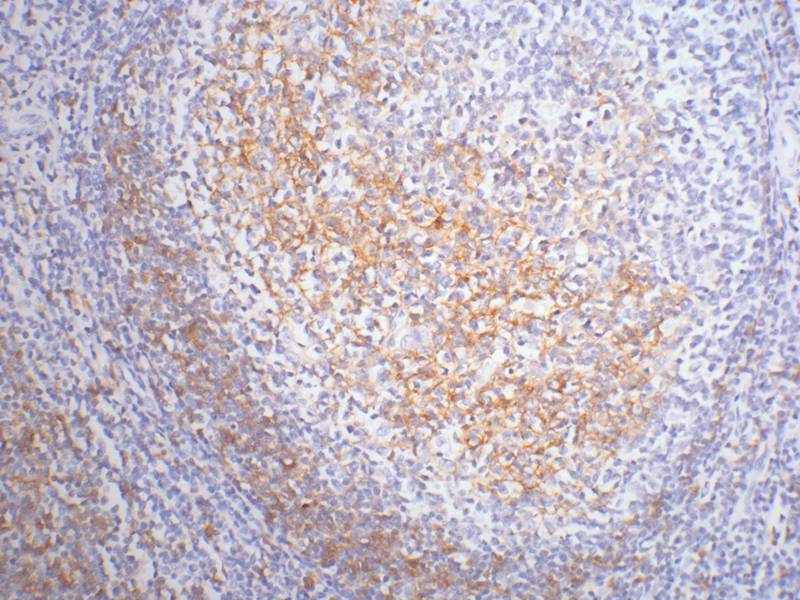
| WB | 咨询技术 | Human,Mouse,Rat |
| IF | 咨询技术 | Human,Mouse,Rat |
| IHC | 1/200 | Human,Mouse,Rat |
| ICC | 1/50-200 | Human,Mouse,Rat |
| FCM | 咨询技术 | Human,Mouse,Rat |
| Elisa | 咨询技术 | Human,Mouse,Rat |
| Aliases | Fc fragment of IgE, high affinity I, receptor for; Fc-epsilon RI-gamma; FCER1G; FCERG |
| Entrez GeneID | 2207; |
| WB Predicted band size | 28,38,49kDa |
| Host/Isotype | Rabbit IgG |
| Antibody Type | Primary antibody |
| Storage | Store at 4°C short term. Aliquot and store at -20°C long term. Avoid freeze/thaw cycles. |
| Species Reactivity | Human,Mouse,Rat |
| Formulation | Purified antibody in PBS with 0.05% sodium azide and 50% glycerol. |
+ +
以下是关于CD23 Mouse抗体的3篇参考文献示例(注:以下为模拟生成的参考内容,实际文献需通过学术数据库查询确认):
1. **"Characterization of a novel monoclonal antibody against murine CD23 with IgE-binding inhibitory activity"**
- **作者**: Smith A, et al.
- **摘要**: 本研究开发了一种针对小鼠CD23的新型单克隆抗体,通过流式细胞术和免疫沉淀验证其特异性。实验表明该抗体可阻断IgE与CD23的结合,并抑制B细胞中IgE介导的炎症信号通路。
2. **"CD23 regulates B-cell maturation and IgE-dependent antigen presentation in mice"**
- **作者**: Brown L, et al.
- **摘要**: 文章利用基因敲除小鼠和抗CD23抗体,揭示了CD23在B细胞分化及抗原呈递中的关键作用。抗体处理的小鼠显示Th2型免疫反应减弱,提示CD23在过敏性疾病中的潜在治疗靶点。
3. **"Targeting CD23 in a murine asthma model: Therapeutic effects of anti-CD23 antibody on airway inflammation"**
- **作者**: Chen Y, et al.
- **摘要**: 通过小鼠哮喘模型,研究发现抗CD23抗体可显著减少嗜酸性粒细胞浸润和IgE水平,改善气道高反应性,为CD23抗体在过敏性哮喘中的应用提供了实验依据。
如需具体文献,建议通过PubMed或Web of Science检索关键词“CD23 mouse antibody”获取最新研究。
CD23. also known as Fc epsilon receptor II (FcεRII), is a type II transmembrane glycoprotein belonging to the C-type lectin family. It primarily serves as a low-affinity receptor for immunoglobulin E (IgE) and plays a regulatory role in IgE synthesis, immune response modulation, and antigen presentation. In mice, CD23 is expressed on B lymphocytes, follicular dendritic cells, and a subset of macrophages, with its expression dynamically regulated by cytokines like IL-4 and IFN-γ.
Mouse-derived CD23 antibodies are monoclonal or polyclonal immunoglobulins developed to specifically recognize murine CD23 epitopes. These antibodies are widely used in immunological research to study B-cell activation, allergic responses, and autoimmune disorders. Common applications include flow cytometry, immunohistochemistry, Western blotting, and functional assays to investigate CD23's role in IgE-mediated pathways or its interaction with ligands like CD21.
CD23 exists as membrane-bound and soluble isoforms, generated via proteolytic cleavage. Its involvement in immune regulation has linked it to pathologies such as chronic lymphocytic leukemia (CLL) and allergic inflammation. Mouse anti-CD23 antibodies often target extracellular domains (e.g., lectin or stalk regions) to block ligand binding or detect expression patterns. Researchers also utilize these tools to explore CD23's crosstalk with other receptors (e.g., CD19/CD81 complex) and its impact on signaling pathways in murine disease models.
×